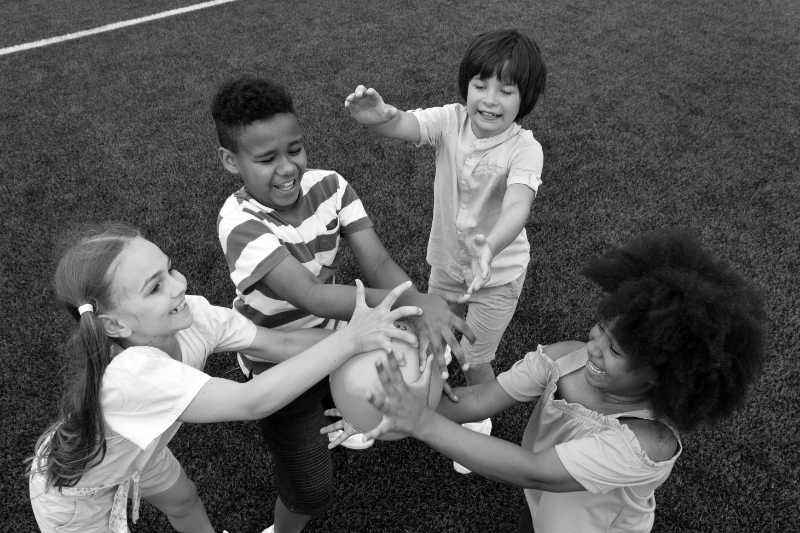Have you ever wondered why some adults lose their cool in tough situations or struggle to get along with others? Many adults today experience similar problems managing their emotions, which affects their social, mental, and practical lives. This limitation in self-regulating emotions is generally the result of underdeveloped skills in childhood.
So, how can such important skills be developed at a young age? The secret lies in the power of play. Engaging children in play-based activities isn’t just for fun; it’s also important for their cognitive, emotional, and social development. Through play, children learn to handle their emotions, control impulses, and interact socially, which are crucial for self-regulation.
Children’s self-regulation through play is the best way to mix fun and learning. When children participate in imaginative play, they encounter instances that challenge them to think critically, connect with others, and demonstrate patience and teamwork. These experiences provide a reliable foundation for the life experiences and coping skills they will require as adults.
This article will explain the importance of play and offer a few ideas for including activities based on play in your children’s daily routines. This will let your children continue enjoying their playtime while developing the abilities needed to cope with everyday challenges. Read on to learn more.
Understanding self-regulation
Self-regulation refers to managing one’s emotions, thoughts, and behaviors. In children, self-regulation begins early — often in infancy — and develops throughout childhood.
Children show early signs of self-regulation as they comfort themselves, follow easy instructions, and manage their emotions in response to changing situations.
Key components of child self-regulation
When learning about the key features of child development, important elements such as self-regulation and interpersonal skills play critical roles. They help children to develop resilience and healthy connections from an early age and encompass key components, such as:
Emotional regulation
Emotional regulation refers to the ability to understand and express emotions healthily. Children who can manage their emotions are better able to deal with various emotions, including joy, grief, and anger.
In relationships, this helps children to express themselves kindly while being respectful of others’ emotions. For example, children are less likely to scream out in anger during a fight and express their feelings gently. This results in healthier interactions and deeper bonds with peers and adults alike.
Impulse management
This refers to resisting immediate wants and making thoughtful choices.
For example, you’ll notice that a child with strong impulse control can wait for their turn in a game rather than snatching a toy impatiently. By developing this skill, children learn to consider the potential consequences of their actions before acting impulsively.
This reduces tantrums and reckless behavior and helps them make sound decisions for their well-being.
Social skills
Self-regulation is crucial in teaching social skills to your children. They pick up basic social skills such as sharing, cooperating, and taking turns.
Children who effectively handle their emotions are able to work with others and solve conflicts peacefully. They learn empathy, respect for other people’s feelings, and how to act confidently in social situations. These skills support smoother conversations and boost a child’s confidence and sense of belonging in social situations.
What happens when children don’t learn self-regulation?
When young children fail to learn self-regulation, they might find it hard to manage their emotions. In the long term, without these skills, children can find it difficult to manage their emotions, have trouble developing friendships, and face academic difficulties. As adults, they are more likely to lose their cool in tough situations and experience increased stress.
These skills support healthy communication in childhood and allow them to manage stress, make informed choices, and maintain positive connections as adults. Thus, teaching self-regulation in children from an early age is critical for developing resilience, empathy, and effective communication skills, putting them on the path to emotional well-being and social competence.
Role of play in development
Play is more than just a fun pastime for children. Research shows that play has important developmental benefits, which can be seen immediately or later in life. It allows children to explore the world, experiment with new ideas, and learn essential life skills. This was supported by Jean Piaget, a pioneering developmental psychologist. Piaget highlighted the importance of play in cognitive development, allowing children to explore and understand the world around them.
According to research, play helps children express and control their emotions. For example, imaginative play helps children understand emotions and build coping skills. Play allows kids to practice problem-solving, increase their creativity, and develop resilience. It activates different areas of the brain, increasing brain activity and emotional development. Moreover, the free nature of play promotes exploration and trying new things, building a sense of control and confidence.
Different types of play contribute to building these essential skills:
Role-playing and make-believe
When children play to be doctors, firefighters, or superheroes, they are developing emotional regulation and social emotional skills. They’re trying to explore various situations, emotions through their characters, and learning how to develop positive peer relationships. Imaginative play motivates them to look at different points of view and build empathy.
Read more: How to Encourage Positive Peer Relationships in Kids
Cooperative games
Cooperative games, like board games or tag, teach children to take turns, manage their anger when they lose, and share their wins with others. This builds their emotional regulation skills, impulse control, and communication abilities.
Creative and imaginative play
Building with blocks, doing art projects, or participating in plays allows children to freely express themselves, explore their emotions, and build problem-solving abilities, all of which help with self-regulation.
Implementing play-based learning
Making play-based learning a part of children’s daily routines can be beneficial for developing self-regulation. Here are some useful tips for achieving this:
Create stimulating play environments
Creating an engaging and exciting environment for your child to play is important for encouraging creative and imaginative play. This gives your child the freedom to explore and express themselves, which is necessary for their growth. Here are some ideas for you to work on while creating this space for your child:
- Indoor play spaces: Set up a corner of your home as a chosen play area. You can include a variety of toys, art tools, and building blocks to fire up your child’s imagination. A comfortable reading space with a collection of books suitable for children is also a great idea.
- Outdoor play areas: Create a natural play area in your own house or choose a specific location at a nearby park. Customize the space with a sandbox, a water table, or climbing structures. Encourage your child to take part in activities such as gardening, nature treasure hunts, or simply exploring the outdoors.
- Rotating toys and activities: To keep your child engaged, you can switch toys and activities regularly. Introducing new options or themes can help keep the play area fresh and exciting, allowing your child to enjoy various types of play while also learning new skills.
Establish a routine for playtimes
Regular playtimes encourage your child to prepare for what is coming up, giving a sense of order and stability that can improve their self-regulation skills. Establishing a playtime routine gives children a feeling of order and consistency. When children know playtime is coming up, they feel safer and prepared, improving their ability to control their emotions and actions. Regular playtime creates a regular pattern, reducing anxiety and allowing children to focus more on playing.
Routines have been scientifically shown to help improve the brain’s planning, attention, and emotional control areas. When children have regular playtimes, they get to practice these skills daily, making it easier for them to cope with change and time management. This makes play more fun and helpful in the short term, and helps children develop critical skills such as focus, resilience, and social skills.
Here is how you can go about it:
- Consistent schedule. Setting aside time frames each day for play. A regular timetable, whether in the morning, afternoon, or evening, helps your child learn to regulate their emotions independently.
- Balanced flexibility. While following a daily routine is important, it is also beneficial to be flexible while maintaining them. You can allow your children to choose activities and personalize playtime to their needs and interests. This creates a sense of control and ownership in their playtime.
- Transition cues. Use simple but effective clues to signal the start and end of playtime. For example, a specific song or a simple timer might help your child prepare for a change in activity, reducing resistance and fostering easier transitions.
Emotional regulation techniques
Introducing emotional regulation skills into play teaches your child how to recognize and manage their emotions successfully. Play is especially helpful in teaching emotional regulation because it allows youngsters to role-play and express their feelings in a safe setting. Children learn to control their emotions in real-world situations by bringing methods such as taking turns and problem-solving into play.
This hands-on method strengthens the brain areas involved in emotions and decision-making, improving their capacity to manage feelings. Research suggests that children develop self-awareness and resilience during playing by managing various emotional situations and learning to react properly. Overall, play develops necessary abilities for lifetime emotional well-being and social competence. This is a necessary component of self-regulation, and here is how you can do it:
- Role-play scenarios. Create role-play scenes where your child can act out various emotions and situations. For example, playing “house” or “school” allows children to engage with different roles and emotional responses, which helps them express their feelings.
- Emotion recognition games. Play games that focus on recognizing and addressing emotions. This could include playing puzzles with emotion cards or presenting stories in which characters experience various emotions. These exercises can teach your child to notice emotional signs in themselves and others.
- Mindfulness activities. Include basic mindfulness exercises in your playtime. Deep breathing, guided images, and yoga for kids are all fun and engaging ways to teach your child how to relax and focus.
Read more: Challenges in Parenthood and How Mindful Parenting Can Help
In conclusion
Picture a little adventurer walking into a new world of their playroom. They could be a daring knight facing a fire-breathing dragon (stuffed toy) or a hardworking architect building a towering city (made of blocks). In reality, your explorer is pursuing a very important goal through this seemingly simple act of play: learning the essential self-regulation skill.
This self-regulation serves as a compass, guiding little ones through childhood’s emotional storms. It helps children to navigate frustration when a tower collapses or develop solutions when their imaginary rival proves too powerful. It’s the social glue that helps kids to form friendships. Finally, it is the key to academic success, supporting focus and drive as children face both large and small challenges.
So, the next time you see a child lost in play, remember that they are doing more than just having fun (though that is important, too!). They’re polishing the skills they’ll require to create their own path to success and fulfillment.
If you would like to see more resources on child self-regulation, check out the Parenting Science Labs. The lab uses the research of the Institute for Life Management Science to produce courses, certifications, podcasts, videos, and other tools. Visit the Parenting Science Labs today.
Photo by Freepik


